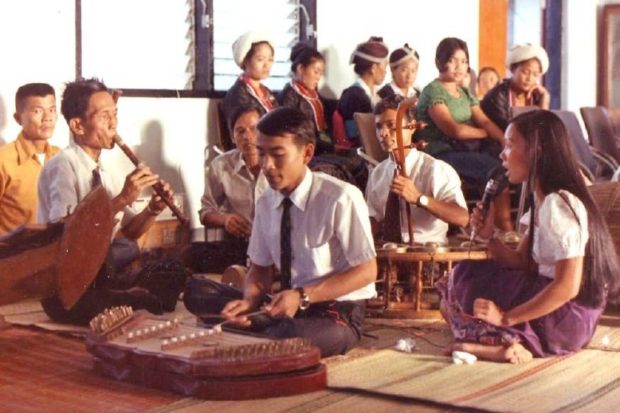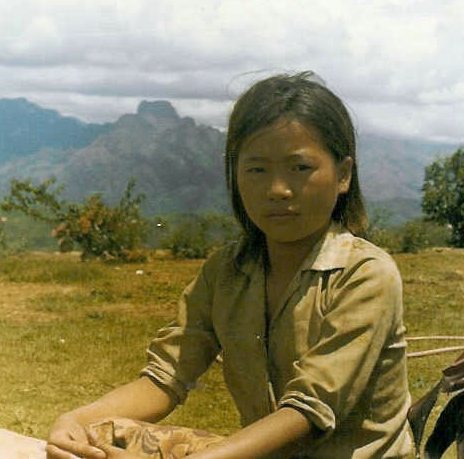
By Richard Stone
“The Hidden War” is the U.S.’s intensive campaign waged in Laos and Cambodia during the Viet Nam War era that was never sanctioned by Congress or acknowledged by the Johnson administration. It changed both countries drastically.
Because many Laotians were persuaded to wage war against the Communists–sometimes in self-defense, sometimes because the U.S, promised assistance (not fulfilled), they became refugees when a Communist government took control. The U.S. finally re-located some of these refugees into our country, and many have settled in Fresno.
Healing Hope is an agency that provides a full range of counseling and social services primarily to the Hmong community but also to other Southeast Asian refugees. Mor Xiong is its intrepid founder and director. She asked me to relate the stories of some of the agency’s clients as mediated by a translator. Here is the third part of a series of four tales of escape and relocation.
MOU VANG MOR
Mou Vang Mor wears her age (75) lightly. Her very full and friendly face is capped by a stylish short haircut that shows to advantage her bright eyes surrounded by smile wrinkles. She wears an appliquéd mauve shirt that nicely complements her complexion, and she has on a delicate necklace and bracelet, perhaps dressed up for the occasion.
Mou was born in a small village of around thirty farming families in the northeast of Laos, toward the border with Viet Nam. She remembers life there as simple and hard, a constant round of work even for children. There was no school, no toys. “We played games with sticks and with the farm animals,” she recalls. By the age of twelve, she was the full-time babysitter of the family’s younger children. (There was a total of twelve, but four died very young.) The village and its inhabitants were all she knew, a small but safe milieu.
When Mou was fourteen, the war began to impact the village. A couple of retreating French soldiers found their way to the village, where Communists then came in pursuit. (Here Mou’s voice starts to intensify.) The French escaped but soon after others came to the village to recruit men to their side. Several went including Mou’s brother. Then a group of Pathet Lao came “to educate” the villagers about their intentions and their war against the colonialists. This was very confusing to the villagers, who had no understanding of the politics of the region.

During this time, Mou got married and began her own family.; but by the time she was seventeen everything changed. American troops had encamped nearby, and they came to the village offering to pay men to fight with them. (Mou’s recitation here became very excited.) Every man in the village went, and it was exceedingly hard for the remaining women to maintain all the farming and household chores.
Then Mou was notified that her husband had been wounded and lost his right arm. She went to take care of him, and for the first time experienced life in the midst of warfare. The noise and confusion terrified her. She and her husband were forced to escape under cover of darkness carrying their children through the jungle to another village. Shortly thereafter the family went to Vientiane, the capital, where her husband could get better medical care. For two years they lived with a Laotian family that fed and cared for them.
After two years, they moved to Long Shen, where she had three more children. The time there was difficult. Americans brought in food once or twice a week, but it was never enough, and the soldiers were fed first. Often the women got nothing. In desperation, Mou and her mother-in-law began to garden on land that wasn’t theirs.
Finally, learning that General Vang Pao, the leader of the Hmong forces, was now in Vientiane, they returned there only to find out he had fled to Thailand. Another general tried to persuade them to stay, but when the city came under heavy attack, they saw hundreds of people fleeing, and in the general tumult, they decided to leave, too. Her husband was able to hire two taxi drivers to take the family to the border and they also found a boatman they could pay to take them across the Mekong River into Thailand.
The family spent four years in refugee camps. In the last two food was scarce and it was very hard. They were confined to the camp, and besides taking care of the children Mou’s only occupation was sewing traditional items for sale to Thai civilians.
The family was fortunate to have a son-in-law living in Minnesota who was able to sponsor them to come there. Arriving in winter, they first months in the U.S. were disorienting and depressing. They were unused to the cold and snow, and to the way of life. They had other relatives in Fresno who told them that the climate and welfare support were better there, and after five years they were able to make the move.
Mou says she is still unsettled by her limited English and understanding of life around her, and by economic pressures. She is, though, very grateful that her children have been able to grow up and take advantage of this country’s opportunities. She is still in contact with family in Laos, who she misses, but has no desire to return to the memories there. She regrets that her children have little interest in Hmong culture, but accepts this as a cost of the war.
*****
Richard Stone is on the boards of the Fresno Center for Nonviolence and Community Alliance and author of the book Hidden in Plain Sight. Contact him at richard2662559@yahoo.com.
